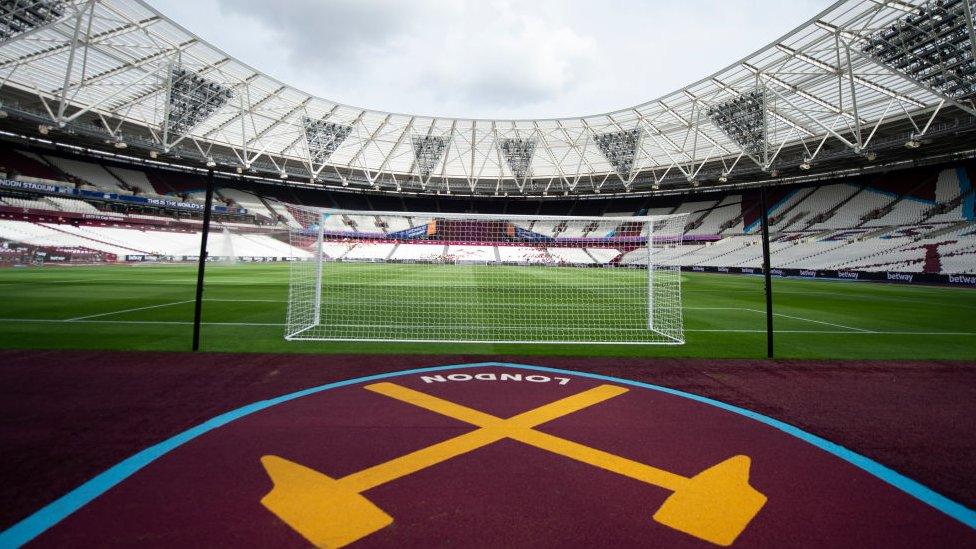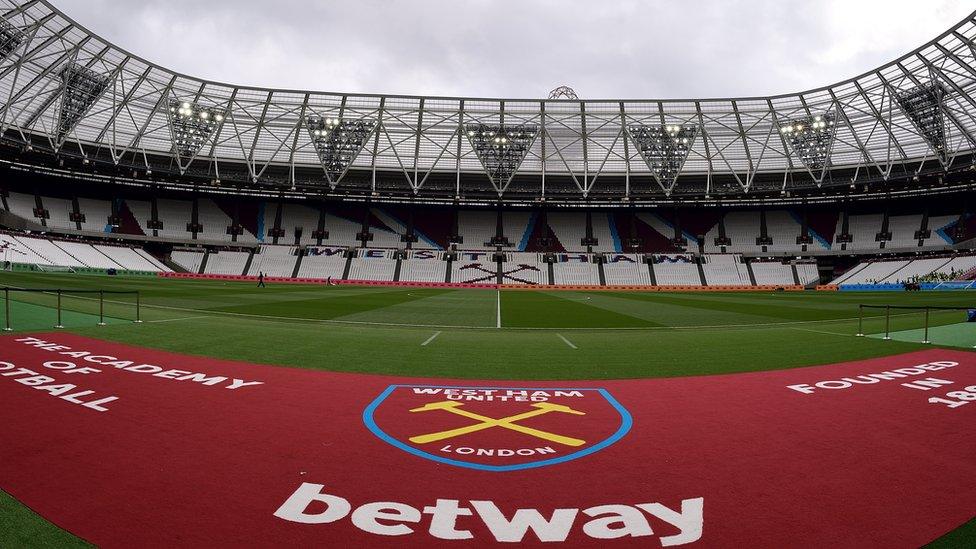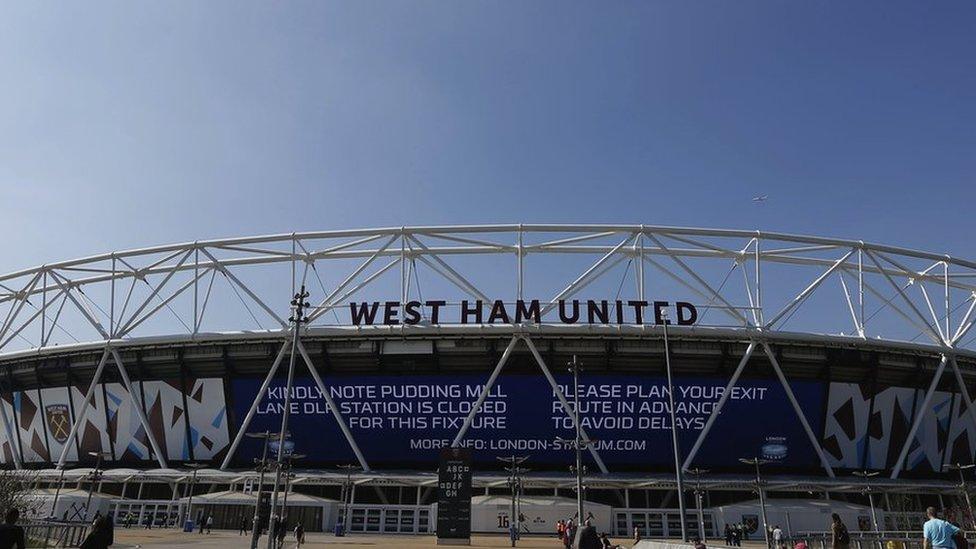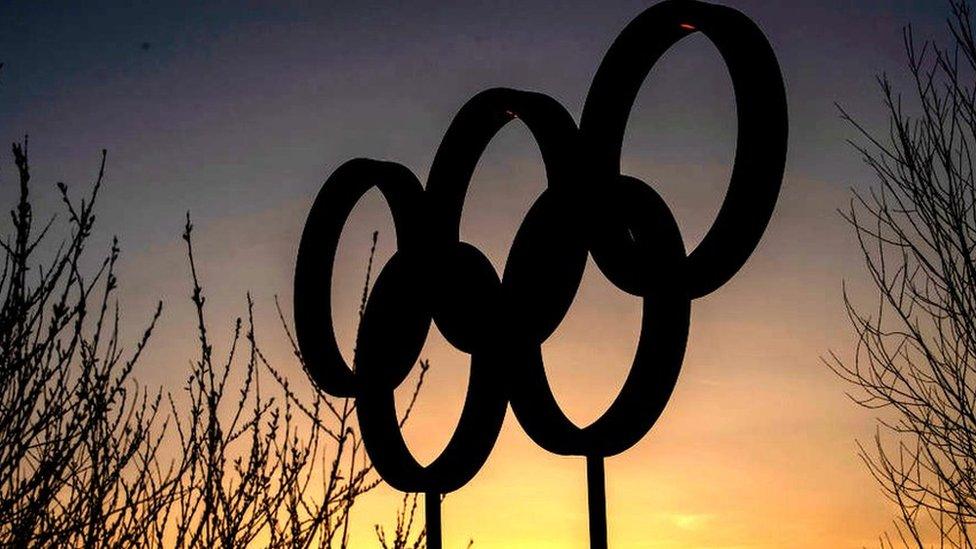London Stadium anti-social fan behaviour costs £500,000
- Published

Riot police moved in after disruption from fans of Belgian club Anderlecht during West Ham's Europa Conference League clash in October
Behaviour by some away fans during West Ham United matches at London's former Olympic stadium has cost the taxpayer more than £500,000 this year.
The figures were revealed by the London Legacy Development Corporation (LLDC), which runs the site - now called the London Stadium.
The LLDC's Lyn Garner said police and stewards had to be deployed because of anti-social fan behaviour.
The comments were made during a London Assembly committee meeting.
Ms Garner said that West Ham's qualification for European competition required higher stewarding and security costs due to the additional games.
West Ham agreed that this, as well as disruption from some away fans, had contributed to the figure.
Ms Garner, head of the LLDC, said that although dealing with rowdy supporters had cost more than £500,000, West Ham United were not required to pay for the extra costs.
The Premier League club is a tenant of London Stadium, in Stratford, east London, paying nearly £4m a year to play there under a controversial agreement struck in 2016.
However, it remains a publicly owned stadium and the total bill to the taxpayer will be £16m this year.
Fans threw seats
Ms Garner told a meeting of the London Assembly's Budget and Performance Committee that a number of Premier League clubs had reported an "uptick" in trouble after the end of Covid restrictions.
In October this year, riot police moved in when fans of Belgian club Anderlecht ripped out seats and threw them at the home fans during West Ham's Europa Conference League clash.
West Ham had to pay for damage to the seating and stadium toilets, but are not required to pay for the extra costs of policing and stewarding now in place, Ms Garner said.
Leader of the Conservatives on the London Assembly Susan Hall said: "It is concerning that not only has there been an increase in issues with fan behaviour at West Ham, but that London taxpayers may have to foot the bill for this."
She added she had asked Ms Garner to write to the club to ask that it contributed more towards the cost of stewarding.

LLDC, which is responsible for the stadium, said non-football events would raise more revenue than ever in future
Spending has also increased because of rising energy costs and inflation, amounting to an estimated £4.6m this year, which is almost a third of the club's total budget.
Ms Garner said she aimed to get the costs to the taxpayer down to between £8m and £10m in the next few years.
She continued there would be more revenue than ever from events other than football in the future, including hosting US major league baseball games and at least three big concerts next summer.
"If we strip out the inflation pressures, we are actually getting close to that target," she said.
Ms Garner added she was "more optimistic" about getting commercial sponsorship for the stadium too, saying "naming rights" would bring in at least £2m a year.
However, assembly members said they had hoped this amount would be considerably more.
Bad behaviour 'exaggerated'
Chris Wheal from West Ham United Supporters' Trust said there had been no trouble from home fans and the picture of poor fan behaviour across the country had been exaggerated.
"Extra costs were incurred because of extra matches due to West Ham's success in European competitions," he said.
"The vandalism by Anderlecht fans was paid for by the Anderlecht club, not by West Ham."
He said the increased cost of stewarding was down to inflation, an increase in the living wage, and being in competition with other stadiums.
"An average of 62,450 fans attend London Stadium matches. Hooliganism is not a feature of football and certainly not at West Ham."

Follow BBC London on Facebook, external, Twitter , externaland Instagram, external. Send your story ideas to hellobbclondon@bbc.co.uk, external
Related topics
- Published9 August 2022

- Published4 August 2022

- Published22 July 2022
